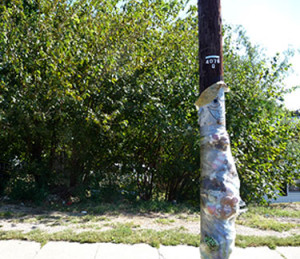Gary Emerling, wtop.com
Editor’s Note: The 2008 fatal shooting of 13-year-old Alonzo Robinson in the Trinidad neighborhood of D.C. helped spark the second incarnation of the Metropolitan Police Department’s now dormant Neighborhood Safety Zones initiative and focused attention on the violence taking place in the city’s Northeast quadrant.
Now, nearly three years later, a trial for the young men accused in the events surrounding the teenager’s death is expected to begin. In a three-part series, WTOP takes a look at the night of Robinson’s death, the response by city police and the subsequent search for justice.
—————-
Part I: A Life Cut Short
WASHINGTON – Nearly three years ago, the electric pole on Holbrook Street in Northeast had plenty of company: SpongeBob SquarePants. The Cat in the Hat. The Tasmanian Devil of Looney Tunes fame.

The cartoon characters clung to the pole’s rough, brown wood in a totem pole menagerie, placed there to remember a life lost in the Trinidad neighborhood.
In the early hours of July 19, 2008, 13-year-old Alonzo Robinson lay crumpled on the ground not far from the pole. Twelve shots had been fired. A gold sedan sped off.
He did not get up.
Today, the controversial police checkpoints that followed Alonzo’s death are gone — cast off after their day in court. The electric pole is inconspicuous, its surface as bare as its role unassuming. There are no stuffed animals, only an empty McDonald’s cup and flattened cans of Keystone Ice nearby.
For some, life has moved on. Memories have faded. For others, the events of that summer night are about to be vividly portrayed — and debated — all over again.
***
Marcella Robinson and her son nearly didn’t leave the house that night.
The single mother from Alabama had been visiting her ailing grandmother, Delores, in D.C. for the past two weeks of July 2008. Most of her time was spent visiting with family and tending to the needs of her grandmother, who had been recently diagnosed with cancer.
A self-described homebody, Marcella knew few people in her grandmother’s Northeast neighborhood on D Street. Alonzo’s personality was similar to his mother’s: He harbored dreams of playing in the NFL someday, but was shy and stayed inside, except when heading out back to beat on a punching bag hung there by his uncle, Tony.
The mother and son lived in the southern town of Opelika, Ala. – sharing a small but comfortable home in a housing project. Now staying in the big city, Alonzo was not a fan of the District’s sometimes somber soundtrack.
“He said there was too much killing and carrying on in D.C.,” Delores said. “Every time he turned around he was hearing the policeman or the ambulance or something going up and down 17th Street, so he just kind of stayed in the house.”
On Friday, July 18, Marcella and Alonzo spent the day celebrating Delores’ sister’s birthday by eating crabs at her house in Northwest. That night, Marcella considered going to a club in Adams Morgan with Tony’s son, Antonio, and her cousin Tiffany. Alonzo pushed for the trip to Tiffany’s home in Trinidad so he could get out of the house.
But as they were about to go, Alonzo had second thoughts about leaving his ill great-grandmother, whom he had doted on by bringing her ice water and making sure she was feeling all right.
“He kind of wanted to go, but he told me, he said, ‘Well, Grandma, if you want me to stay here with you, I will,'” Delores said. “But I told him ‘No, don’t stay here because I’ll be all right. You’ve been in the house ever since you’ve been here and you getting ready to go back home, so go and have some fun…’
“That particular day, he was just so happy.”
***
The next few hours were spent outside and at family members’ apartments in Trinidad. The group talked, laughed and visited. Marcella and Tiffany soon gave up on going to the club, content with enjoying their present company.
“It was hot, so you know, everybody was out, a lot of people was out,” Tony said. “We just was talking among each other, just enjoying the weather.
“Chillin’.”
The hours flew by to 2 a.m. Alonzo had grown tired and was ready to leave.
“The last time he came in there, I looked at him and he was just ‘You gonna stay?'” Marcella said. “And I was like ‘Nah, I’m coming.’ So I got up and I grabbed my little backpack … and we started walking down the steps together.”
Alonzo and Marcella made their way back down the sidewalk toward the car, which was parked across Holbrook Street, in front of a grassy area flanked by several trees and split by a wooden electric pole.
Uncle Tony stopped to talk to a woman who lived in the neighborhood. Marcella and Alonzo leaned up against the car, while their cousins, Antonio and Tiffany, whispered nearby.
Minutes passed. Marcella’s impatience grew. She moved closer to her cousins in a nosy attempt to overhear their conversation.
A car pulled up to the stop sign at the intersection of Queen and Holbrook, up the street from Marcella.
As the vehicle turned, the bright glare of its headlights drew her attention, and she raised her arm in front of her eyes as a shield. Alonzo wandered over near a tree, just 4 feet away from his mother.
“I thought they were going to just keep passing by at first,” Marcella said.
The car, a gold Dodge Intrepid, slowed to a stop beside Marcella. She saw a teenager inside the open driver’s side window, his face framed by dreadlocks but hard to make out.
“What’s up?” a voice said from inside the car.
Then the driver stuck a gun out the window.
***
Tomorrow in Part II: The failure of crime control
(Copyright 2011 by WTOP. All Rights Reserved.)







